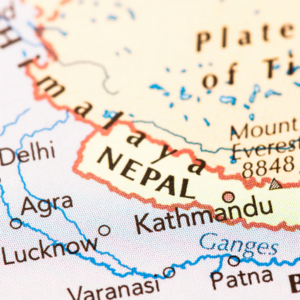A $10,000 grant from the Rural Coordination Centre of BC (RCCbc) was used to help bring more awareness of best practices in palliative medicine to rural Nepal.
The project used the virtual ECHO (Extension for Community Healthcare Outcomes) model to train Nepalese practitioners, particularly in rural and remote areas of Nepal, in adult palliative care.

In order to support the project, providers in Canada applied for the Rural Global Health Partnership Initiative grant administered by RCCbc.
As part of the project, which went ahead during a period of travel restrictions because of COVID-19 concerns, a series of ten 1.5-hour biweekly virtual sessions were held. The sessions consisted of short lectures, case presentations and discussions and were co-presented by palliative care providers in Nepal and Canada. This method helped to ensure content and approach were culturally appropriate for the Nepali audience.
A similar ECHO model of training was used successfully in other countries, and it was felt that it could have success in Nepal too. The work builds on the work of the Two Worlds Cancer Collaboration.
Dr. Robin Love, who supported this program through his involvement with Two World Cancer Collaboration, said palliative medicine has not been something that governments in developing countries have prioritized, but projects like this help move the dial.
“By the time people – especially rural people – show up at a doctor their cancer [or other illness] is very advanced usually and so they’re beyond treatment, so treatment of pain and suffering and proper end of life care is important,” he said.
He said a project like this can make a big difference because the barriers are low. “It’s actually cheap to provide palliative care, you only need about five cheap drugs and you can prevent a lot of suffering. You just need to know how to use them, so that’s what we were trying to do.”
Dr. Danielle Downe, who spearheaded the ECHO project in Nepal, said: “For this iteration we started to virtually disseminate some basic palliative care education to providers across all provinces that they could then take back to their centres and implement for patients that they’re seeing in front of them. It meant that providers did not feel like they had to travel in order to access this type learning.”
Dr. Deepak Shrestha was one of the Nepalese doctors involved in the project who helped ensure the project connected to rural practitioners on the ground.
A total of 35 participants took part in the training, and the hope is that they will share their knowledge with dozens of other providers in the field.
Dr. Shrestha said: “This project has helped increase knowledge of and awareness of palliative care. We have realized a sense of deeper understanding and acceptance by the participants, who are the service providers to the needy, in distant parts of the country.”
He continued: “Also, the program was a great platform to bring together so many experts in the field of palliative care and connect them to the participants and their institutions. This can be instrumental for knowledge and resource sharing for more effective care delivery.”
Dr. Downe said in Nepal, just as in Canada, people who work in larger centres can lose sight of the fact that rural centres are so capable. “I think that there’s this belief that sub-specialty services are best delivered in a city. But if you actually allow for education and growth of the providers in these rural communities, they can do an excellent job exactly where they are,” she said.
Dr. Downe and Dr. Love said they were confident that Dr. Shrestha had been given the tools to continue the work on the ground.
Dr. Shrestha agreed. He said Project ECHO was “instrumental” in igniting an interest in palliative care within him.
He added: “It made me realize how important it is to ignite the same interest amongst the medical practitioners here in Nepal and hence, I am playing my little part as well.”
The Rural Global Health Partnership Initiative grants are available to projects supporting under-resourced communities in BC, Canada or internationally. If you are interested in applying for a grant, the next deadline to apply is April 30, 2023.
For more information on the Two Worlds Cancer Collaboration, a Canadian charity that assists healthcare professionals in less resourced countries in palliative care, end-of-life care and cancer control strategies, visit their website or email [email protected].


